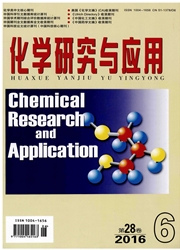

 中文摘要:
中文摘要:
以马来酸酐和正丁醇为原料,用微波协同离子液体[ HSO3-pmim]+[ HSO4]-催化合成了马来酸二丁酯。通过单因素实验和正交试验考察催化剂种类、催化剂用量、马来酸酐与正丁醇物质的量比、微波功率、微波时间对马来酸二丁酯产率的影响。实验结果表明,马来酸二丁酯最佳合成条件为:马来酸酐与正丁醇物质的量比1∶4,以离子液体[HSO3-pmim]+[HSO4]-为催化剂,其用量为2.0g,微波功率为600W,微波时间为15min,马来酸二丁酯产率可达到99.36%。在微波辐射下,催化剂离子液体[ HSO3-pmim]+[ HSO4]-重复使用7次后活性没有明显降低,马来酸二丁酯产率仍高于96%,表明该催化剂具有较好的反应活性和稳定性。与常规加热方式相比,微波加热提高了反应效率,缩短了反应时间。
 英文摘要:
英文摘要:
Dibutyl maleate was synthesized from maleic anhydride and n-butanol using ionic liquid[ HSO3-pmim]+[ HSO4 ]-as cat-alyst under microwave irradiation. The molar ratio of maleic anhydride and n-butanol,the type of catalysts and dosage,microwave power and irradiated time were explored by single factor experiment and orthogonal experiment. The results showed that optimal con-ditions were the molar ratio of maleic anhydride and n-butanol was 1∶4,dosage of ionic liquid[HSO3-pmim]+[HSO4]-catalyst was 2. 0g,microwave power was 600W,and microwave irradiated time was 15min. The yield of dibutyl maleate was up to 99. 36%under the optimized condition. The ionic liquid[ HSO3-pmim]+[ HSO4 ]-exhibited excellent stability and catalytic activity under the reac-tion conditions. Moreover, it could be reused seven times without considerable loss of activity with at least 96% conver-sion. Compared with conventional heating,microwave irradiation enhanced catalytic efficiency,as well as reduced reaction time.
 同期刊论文项目
同期刊论文项目
 同项目期刊论文
同项目期刊论文
 Synthesis, Characterization, Optical and Electrochemical Properties of Fulleropyrrolidines Containin
Synthesis, Characterization, Optical and Electrochemical Properties of Fulleropyrrolidines Containin NiCo2 Alloys: Controllable Synthesis, Magnetic Properties, and Catalytic Applications in Reduction o
NiCo2 Alloys: Controllable Synthesis, Magnetic Properties, and Catalytic Applications in Reduction o Graphene oxide sheet-prussian blue nanocomposites: Green synthesis and their extraordinary electroch
Graphene oxide sheet-prussian blue nanocomposites: Green synthesis and their extraordinary electroch Monodispersed FeNi2 alloy nanostructures: solvothermal synthesis, magnetic properties and size-depen
Monodispersed FeNi2 alloy nanostructures: solvothermal synthesis, magnetic properties and size-depen Gas-assisted growth of boron-doped nickel nanotube arrays: rapid synthesis, growth mechanisms, tunab
Gas-assisted growth of boron-doped nickel nanotube arrays: rapid synthesis, growth mechanisms, tunab Reduced Graphene Oxide/CuI Nanocomposite: An Efficient and Recyclable Catalyst for the N-Phenylation
Reduced Graphene Oxide/CuI Nanocomposite: An Efficient and Recyclable Catalyst for the N-Phenylation Enzyme-free Amperometric H2O2 Biosensor Based on CuAg Bimetallic Nanoparticles with Reduced Graphene
Enzyme-free Amperometric H2O2 Biosensor Based on CuAg Bimetallic Nanoparticles with Reduced Graphene Preparation of Cyclodextrin-Modified Multi-Walled Carbon Nanotubes Through Acylamide Bond and Its Ap
Preparation of Cyclodextrin-Modified Multi-Walled Carbon Nanotubes Through Acylamide Bond and Its Ap 期刊信息
期刊信息
